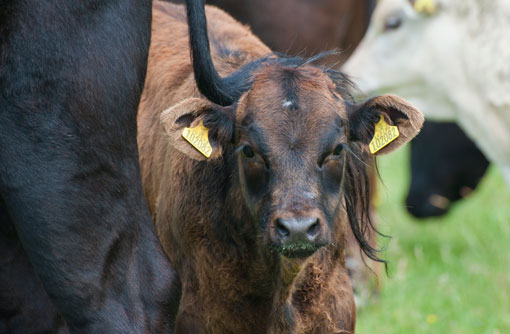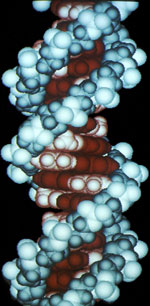When is a pedigree not what it should be?

When is a pedigree not all it should be? When a DNA test proves it is wrongly recorded. Jonathan Long investigates what is being done to ensure the integrity of pedigree stock.
Buying new stock should be an easy exercise, particularly when you have the benefit of estimated breeding values and pedigree information to help inform your choice.
But, as several recent cases have shown, these valuable pieces of information – which can greatly influence buying decisions – can sometimes be incorrect due to errors made when recording an animal’s parentage.
A number of beef bulls sold for significant sums have then been proven to have incorrect pedigree information, highlighting the errors which can occur.
 One notable case saw a Charolais bull sold for 38,000gns returned to his breeders due to his sire being incorrect. His parentage was later corrected and he subsequently sold for 28,000gns.
One notable case saw a Charolais bull sold for 38,000gns returned to his breeders due to his sire being incorrect. His parentage was later corrected and he subsequently sold for 28,000gns.
In another instance, the sire of a 17,000gns Limousin bull also proved to have been incorrectly recorded, and months were spent ascertaining the correct sire – eventually traced as a bull calf of another cow in the same herd.
So, with both financial risk and the integrity of genetic evaluation programmes used to calculate estimated breeding values at stake, what can and is being done to ensure animals are true to their pedigrees?
Testing
For its part, the British Charolais Cattle Society now requires all bulls sold through its sales to be sire verified by DNA testing.
The reason why these extra parentage checks are being carried out is twofold, explains BCCS chief executive David Benson. “Firstly, there have been several incorrect parentages found which can be very costly for the breeder and the buyer. And secondly, incorrect parentage recording can have a serious impact on the genetic evaluations.
“EBV calculations rely heavily on the performance of not just the animal in question, but also their siblings and other relatives. If an animal’s pedigree isn’t recorded correctly then its EBVs are likely to be inaccurate and potentially misleading.
“Like most breeds, we have had instances in the recent past where, through no fault of the breeder, an honest mistake has happened and the wrong sire has been declared on the pedigree. In one particular case the bull was sold to a commercial producer who had been looking for an easy calving sire.
Pedigree
“He bought the bull on the basis of both his pedigree, his EBVs and also his physical appearance. But particularly for his easy calving figures. However, once he started calving the offspring of the bull he became disullsioned with the EBV system as it turned out to be harder calving bull than it should have been.
“A simple DNA test proved that the bull’s sire was wrongly recorded and when its correct sire was put into its pedigree its EBVs changed and its harder calving nature was apparent in them.”
Mr Benson says in 99% of cases where the wrong sire is recorded it is simple human error. “Either the wrong AI sire has been written down, or the wrong straw of semen has been drawn from the flask. Or bulls have been swapped over between batches of cows and a cow thought to be in calf to one bull, is in fact in calf to another.”
However, he does admit there may be the odd instance where the sire is wrongly recorded on purpose. “There is definitely a financial gain from having good EBVs, so declaring a bull to be by a high EBV sire can have a big impact on its figures and hence its potential sale price. Also it could be that a breeder wants to avoid paying the royalty charge on some semen, so puts a different sire on the pedigree. It’s not a regular occurrence, but the odd one crops up now and again.”
Where an error is found, the society will take various actions, depending on the likely cause of the error and the ease with which it can be resolved. “In most cases the bull is re-registered with the correct sire details and it is likely that a few other calves from the herd will be DNA tested as a double check.”
At the current time the British Limousin Cattle Society (BLCS) do not require DNA sire verification, however, it’s governing council have agreed in principle to introduce it at society sales from October this year, explains chief executive Iain Kerr. “Increasingly buyers, both commercial and pedigree, are relying on the EBV and pedigree information when making their purchases. They are either looking for a bull by a particular sire or a bull with certain traits.
Profiling
“Since 1999 we have been DNA profiling all the sires registered in the Limousin herd book as a tool for ensuring the integrity of the pedigrees and in all that time we’ve never had a case where a bull has come back with the incorrect sire and we haven’t been able to correct it.
“But of course this doesn’t cover the bulls which are sold for commercial use and making sure the pedigree is correct is an important part of the equation when the EBVs rely so heavily on this information.”
At the last three BLCS [sales?] hair samples have been taken at random from 50 bulls, with just two bulls out of that selection found to be registered to the incorrect sire, he says. “Both of these cases were quickly resolved and bearing in mind the number of ways a mistake can happen, that’s a very low percentage.
“Where there is a problem, the buyer is alerted and then they have a number of options available to them as a redress. Some choose to return the bull to the breeder, others make other arrangements.”
And while he recognises there are significant financial gains to be had from an animal having a certain sire, Mr Kerr does not believe breeders are intentionally being fraudulent.
Verification
But it wasn’t just a case of protecting the integrity of pedigrees and EBVs that spurred the Aberdeen-Angus Cattle Society to introduce compulsory sire verification at society sales three years ago, explains chief executive Ron McHattie. “Sire verification for sales is done at the society’s expense both to increase the integrity of the herd book, but also to protect the integrity of the Aberdeen-Angus brand, which is the most well-known beef breed in the world.
“With a number of marketing schemes operating in the UK for Aberdeen-Angus beef, it is important to protect the brand as much as we can. While we don’t compulsorily DNA sample all bulls sold for commercial use, we do offer a voluntary profiling option for bulls sold privately and are building an expanding database of working bulls for the purposes of brand protection.”
And, in line with the other breed societies where a pedigree is found to be incorrect, the animal can be re-registered with the correct sire on the pedigree. “Thankfully we’ve never had an incident where a high-priced bull has been incorrect, but I would understand if a buyer wanted to cancel a sale if the bull he bought didn’t have the genetics he thought he was buying.”
One of the most recent and high-profile cases of incorrect parentage occurred in the Holsteins, where, following DNA sampling as a result of movement irregularities, one animal was found to have no biological link with its dam.
While failing to record the correct dam may seem a fundamental error, Holstein UK’s Suzanne Harding says mistakes can be made easily if two or more cows are calving down at the same time in a yard. “It’s particularly easy to do at night if two cows calve down close to each other and the calves become mismothered.”
Integrity
But, like their beef counterparts, Holstein UK implements several measures to ensure the integrity of its herd book. “We randomly check a proportion of all calves registered each year and in 2010 checked the full parentage of 0.24% of all calves registered. In addition, any bull being registered in the herd book has to be DNA checked which eases DNA checking for calves born by natural service.
“Since the beginning of the year all ET calves must be fully parentage checked too. The remaining calves checked are selected at random by computer, with differing proportions coming from different risk groups. So, a larger proportion of the random selection will be AI calves, while a lower number of lower risk natural service calves will be checked.”
Many breeders are also opting to voluntarily check parentage where they are unsure of a sire or a dam. “Where a number of cows have calved and the breeder wants to be sure of the dam, or where they aren’t convinced the calf looks like it should from a particular sire they often chose to check them themselves.”
Where an animal’s pedigree is found to be incorrect, if its correct parentage can be found it is reregistered with the correct sire and dam. “But if its parentage can’t be assured then it is deregistered from the herd book.”
